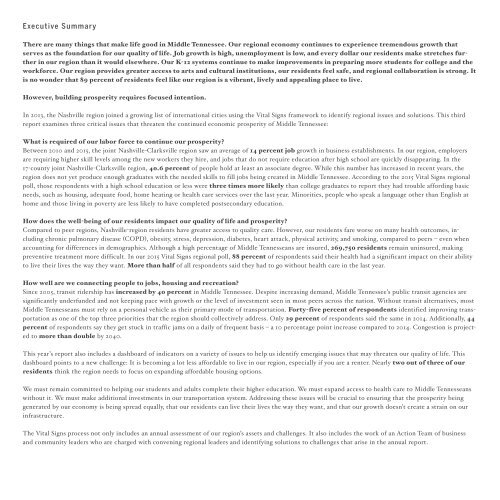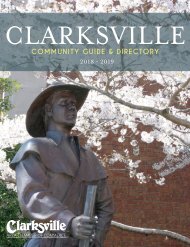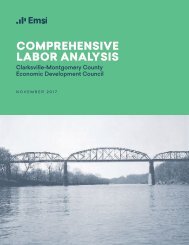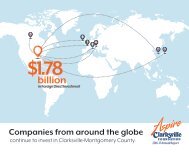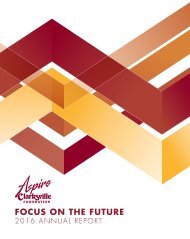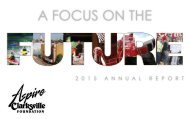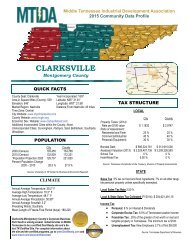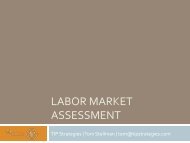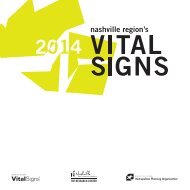vital_signs_2015_web
You also want an ePaper? Increase the reach of your titles
YUMPU automatically turns print PDFs into web optimized ePapers that Google loves.
Executive Summary<br />
There are many things that make life good in Middle Tennessee. Our regional economy continues to experience tremendous growth that<br />
serves as the foundation for our quality of life. Job growth is high, unemployment is low, and every dollar our residents make stretches further<br />
in our region than it would elsewhere. Our K-12 systems continue to make improvements in preparing more students for college and the<br />
workforce. Our region provides greater access to arts and cultural institutions, our residents feel safe, and regional collaboration is strong. It<br />
is no wonder that 89 percent of residents feel like our region is a vibrant, lively and appealing place to live.<br />
However, building prosperity requires focused intention.<br />
In 2013, the Nashville region joined a growing list of international cities using the Vital Signs framework to identify regional issues and solutions. This third<br />
report examines three critical issues that threaten the continued economic prosperity of Middle Tennessee:<br />
What is required of our labor force to continue our prosperity?<br />
Between 2010 and <strong>2015</strong>, the joint Nashville-Clarksville region saw an average of 14 percent job growth in business establishments. In our region, employers<br />
are requiring higher skill levels among the new workers they hire, and jobs that do not require education after high school are quickly disappearing. In the<br />
17-county joint Nashville-Clarksville region, 40.6 percent of people hold at least an associate degree. While this number has increased in recent years, the<br />
region does not yet produce enough graduates with the needed skills to fill jobs being created in Middle Tennessee. According to the <strong>2015</strong> Vital Signs regional<br />
poll, those respondents with a high school education or less were three times more likely than college graduates to report they had trouble affording basic<br />
needs, such as housing, adequate food, home heating or health care services over the last year. Minorities, people who speak a language other than English at<br />
home and those living in poverty are less likely to have completed postsecondary education.<br />
How does the well-being of our residents impact our quality of life and prosperity?<br />
Compared to peer regions, Nashville-region residents have greater access to quality care. However, our residents fare worse on many health outcomes, including<br />
chronic pulmonary disease (COPD), obesity, stress, depression, diabetes, heart attack, physical activity, and smoking, compared to peers – even when<br />
accounting for differences in demographics. Although a high percentage of Middle Tennesseans are insured, 269,750 residents remain uninsured, making<br />
preventive treatment more difficult. In our <strong>2015</strong> Vital Signs regional poll, 88 percent of respondents said their health had a significant impact on their ability<br />
to live their lives the way they want. More than half of all respondents said they had to go without health care in the last year.<br />
How well are we connecting people to jobs, housing and recreation?<br />
Since 2005, transit ridership has increased by 40 percent in Middle Tennessee. Despite increasing demand, Middle Tennessee’s public transit agencies are<br />
significantly underfunded and not keeping pace with growth or the level of investment seen in most peers across the nation. Without transit alternatives, most<br />
Middle Tennesseans must rely on a personal vehicle as their primary mode of transportation. Forty-five percent of respondents identified improving transportation<br />
as one of the top three priorities that the region should collectively address. Only 29 percent of respondents said the same in 2014. Additionally, 44<br />
percent of respondents say they get stuck in traffic jams on a daily of frequent basis – a 10 percentage point increase compared to 2014. Congestion is projected<br />
to more than double by 2040.<br />
This year’s report also includes a dashboard of indicators on a variety of issues to help us identify emerging issues that may threaten our quality of life. This<br />
dashboard points to a new challenge: It is becoming a lot less affordable to live in our region, especially if you are a renter. Nearly two out of three of our<br />
residents think the region needs to focus on expanding affordable housing options.<br />
We must remain committed to helping our students and adults complete their higher education. We must expand access to health care to Middle Tennesseans<br />
without it. We must make additional investments in our transportation system. Addressing these issues will be crucial to ensuring that the prosperity being<br />
generated by our economy is being spread equally, that our residents can live their lives the way they want, and that our growth doesn’t create a strain on our<br />
infrastructure.<br />
The Vital Signs process not only includes an annual assessment of our region’s assets and challenges. It also includes the work of an Action Team of business<br />
and community leaders who are charged with convening regional leaders and identifying solutions to challenges that arise in the annual report.


